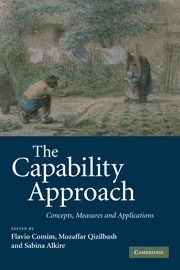1 - Using the capability approach: prospective and evaluative analyses
Published online by Cambridge University Press: 22 September 2009
Summary
‘Anxiety is the mark of spiritual insecurity. It is the fruit of unanswered questions. But questions cannot go unanswered unless they first be asked. And there is a far worse anxiety, a far worse insecurity, which comes from being afraid to ask the right questions – because they might turn out to have no answer. One of the moral diseases we communicate to one another in society comes from huddling together in the pale light of an insufficient answer to a question we are afraid to ask.’
The focal question
The focal question of the conference that gave rise to this volume was how Amartya Sen's capability approach, which appears to have captured the interest of many, could be put to use in confronting poverties and injustices systematically and at a significant level. The often-discussed issue beneath that question is whether the research sparked by the capability approach gives rise to more effective practical methodologies to address pressing social problems. Of course ensuing applications are not the only grounds on which to examine a proposition – its theoretical implications, its measurability, or its conceptual coherence might also be fruitfully examined, for example. The extent to which specific applications and techniques embody the approach – their accuracy and limitations – might also be of interest. But in the context of poverty and justice it would appear directly relevant to evaluate concrete applications and consequences, whatever else we also examine. Such a sharp focus might generate anxiety.
Information
- Type
- Chapter
- Information
- The Capability ApproachConcepts, Measures and Applications, pp. 26 - 50Publisher: Cambridge University PressPrint publication year: 2008
References
Accessibility standard: Unknown
Why this information is here
This section outlines the accessibility features of this content - including support for screen readers, full keyboard navigation and high-contrast display options. This may not be relevant for you.Accessibility Information
- 72
- Cited by
